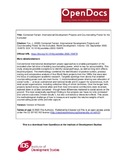| dc.contributor.author | Fox, Jonathan | |
| dc.date.accessioned | 2020-05-21T10:43:14Z | |
| dc.date.available | 2020-05-21T10:43:14Z | |
| dc.date.issued | 2020-09 | |
| dc.identifier.citation | Fox, J. (2020) Contested Terrain: International Development Projects and Countervailing Power for the Excluded, World Development, Volume 133, September 2020, 104978. DOI: 10.1016/j.worlddev.2020.104978 | en |
| dc.identifier.uri | https://opendocs.ids.ac.uk/opendocs/handle/20.500.12413/15321 | |
| dc.description.abstract | Conventional international development project approaches to enable participation of the excluded often fall short of building countervailing power, which is key for accountability. This study analyzes possible exceptions to identify causal pathways, as well as long-term effects beyond projects. The methodology combines the identification of positive outliers, process tracing and comparative analysis of five World Bank projects from the 1990s that were also the focus of subsequent academic research. Tangible openings from above that enabled countervailing power took two main forms: 1) institutionalized power-sharing over allocation of social funds — at local, subnational and national levels and 2) support for autonomous, multi-level social organizations, including collective titling of ethnic territories. Over the longer term, projects lacked strong national allies and their most innovative contributions were reversed, watered down or at best contained - though these differences mattered to social actors on the ground. The most analytically significant finding is that projects can have not only contested and uneven outcomes (“mixed results”), but also contradictory interaction effects. This poses the methodological challenge of how to measure and explain the relative weights of both countervailing power shifts and elite capture. | en |
| dc.language.iso | en_US | en |
| dc.publisher | Elsevier Ltd. | en |
| dc.rights.uri | http://creativecommons.org/licenses/by-nc-nd/4.0/ | en |
| dc.subject | Aid | en |
| dc.subject | Governance | en |
| dc.title | Contested Terrain: International Development Projects and Countervailing Power for the Excluded | en |
| dc.type | Article | en |
| dc.rights.holder | © 2020 The Author(s). Published by Elsevier Ltd. | en |
| dc.identifier.externaluri | https://www.sciencedirect.com/science/article/pii/S0305750X20301042?via%3Dihub | en |
| dc.identifier.team | Power and Popular Politics | en |
| dc.identifier.doi | https://doi.org/10.1016/j.worlddev.2020.104978 | |
| dcterms.dateAccepted | 2020-03-12 | |
| rioxxterms.funder | Department for International Development | en |
| rioxxterms.identifier.project | PO7239 Action for Empowerment and Accountability Programme | en |
| rioxxterms.version | VoR | en |
| rioxxterms.versionofrecord | https://doi.org/10.1016/j.worlddev.2020.104978 | en |
| rioxxterms.funder.project | 01e10511-513a-43f3-ad45-97d8cb13bae0 | en |


